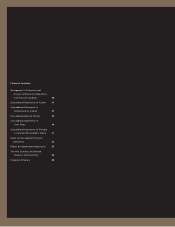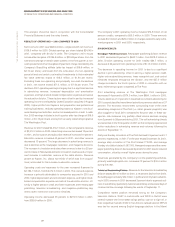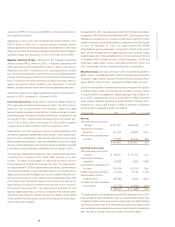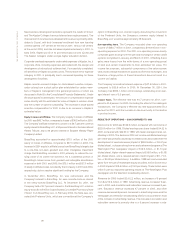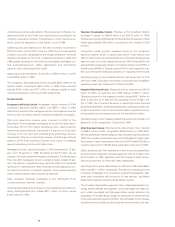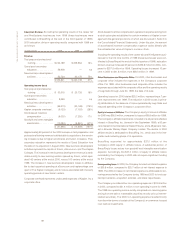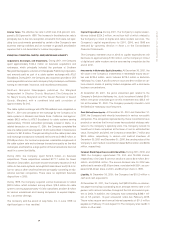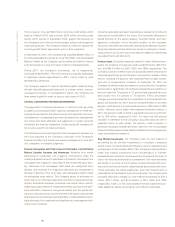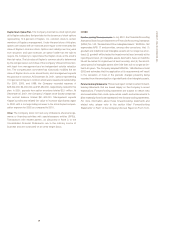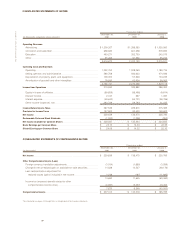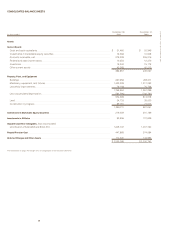Washington Post 2001 Annual Report Download - page 6
Download and view the complete annual report
Please find page 6 of the 2001 Washington Post annual report below. You can navigate through the pages in the report by either clicking on the pages listed below, or by using the keyword search tool below to find specific information within the annual report.
33
Education Division. Excluding the operating results of the career fair
and HireSystems businesses from 1999 (these businesses were
contributed to BrassRing at the end of the third quarter of 1999),
2000 education division operating results compared with 1999 are
as follows:
(in thousands) 2000 1999 % Change
Revenue
Test prep and professional
training................... $ 244,189 $ 209,964 16%
Quest post-secondary
education ................. 56,908 — n/a
New business development
activities .................. 52,724 30,175 75%
......................................... $ 353,821 $ 240,139 47%
Operating income (loss)
Test prep and professional
training................... $ 30,315 $ 25,733 18%
Quest post-secondary
education ................. 8,359 — n/a
New business development
activities .................. (55,313) (20,128) (175%)
Kaplan corporate overhead.. (9,123) (7,153) (28%)
Stock-based incentive
compensation ............ (6,000) (7,250) 17%
Goodwill and other intangible
amortization .............. (10,084) (6,861) (47%)
......................................... $ (41,846) $ (15,659) (167%)
Approximately 50 percent of the 2000 increase in test preparation and
professional training revenue is attributable to acquisitions; the remain-
ing increase is due to higher enrollments and tuition increases. Post-
secondary education represents the results of Quest Education from
the date of its acquisition in August 2000. New business development
activities represent the results of Score!, eScore.com, and The Kaplan
Colleges. The increase in new business development revenue is attrib-
utable mostly to new learning centers opened by Score!, which oper-
ated 142 centers at the end of 2000, versus 100 centers at the end of
1999. The increase in new business development losses is attributa-
ble to start-up period spending at eScore.com and kaplancollege.com
(part of The Kaplan Colleges) and to losses associated with the early
operating periods of new Score! centers.
Corporate overhead represents unallocated expenses of Kaplan, Inc.’s
corporate office.
Stock-based incentive compensation represents expense arising from
a stock option plan established for certain members of Kaplan’s man-
agement (the general provisions of which are discussed in Note G to
the Consolidated Financial Statements). Under this plan, the amount
of stock-based incentive compensation expense varies directly with
the estimated fair value of Kaplan’s common stock.
Including the operating results of the career fair and HireSystems busi-
nesses for the first nine months of 1999 (these businesses were con-
tributed to BrassRing at the end of the third quarter of 1999), education
division revenue increased 37 percent to $353.8 million for 2000, com-
pared to $257.5 million for 1999. Operating losses increased 10 per-
cent in 2000 to $41.8 million, from $38.0 million in 1999.
Other Businesses and Corporate Office. For 2000, other businesses and
corporate office includes the expenses of the Company’s corporate
office. For 1999, other businesses and corporate office includes the
expenses associated with the corporate office and the operating results
of Legi-Slate through June 30, 1999, the date of its sale.
Operating losses for 2000 totaled $25.2 million, representing a 7 per-
cent improvement over 1999. The reduction in 2000 losses is prima-
rily attributable to the absence of losses generated by Legi-Slate and
reduced spending at the Company’s corporate office.
Equity in Losses of Affiliates. The Company’s equity in losses of affiliates
for 2000 was $36.5 million, compared to losses of $8.8 million for 1999.
The Company’s affiliate investments consisted of a 42 percent effective
interest in BrassRing, Inc. (formed in late September 1999), a 50 per-
cent interest in the International Herald Tribune, and a 49 percent inter-
est in Bowater Mersey Paper Company Limited. The decline in 2000
affiliate results is attributable to BrassRing, Inc., which was in the inte-
gration and marketing phase of its operations.
BrassRing accounted for approximately $37.0 million of the
Company’s 2000 equity in affiliate losses. A substantial portion of
BrassRing’s losses arises from goodwill and intangible amortization
expense. Accordingly, the $37.0 million of equity in affiliate losses
recorded by the Company in 2000 did not require significant funding
by the Company.
Non-operating Items. In 2000, the Company incurred net interest expense
of $53.8 million, compared to $25.7 million of net interest expense in
1999. The 2000 increase in net interest expense is attributable to bor-
rowings executed by the Company during 1999 and 2000 to fund cap-
ital improvements, acquisition activities, and share repurchases.
The Company recorded other non-operating expense of $19.8 million
in 2000, compared to $21.4 million in non-operating income for 1999.
The 1999 non-operating income mostly comprised non-recurring gains
arising from the sale of marketable securities (mostly various Internet-
related securities). The 2000 non-operating expense resulted mostly
from the write-downs of certain of the Company’s e-commerce focused
cost method investments.
THE WASHINGTON POST COMPANY

